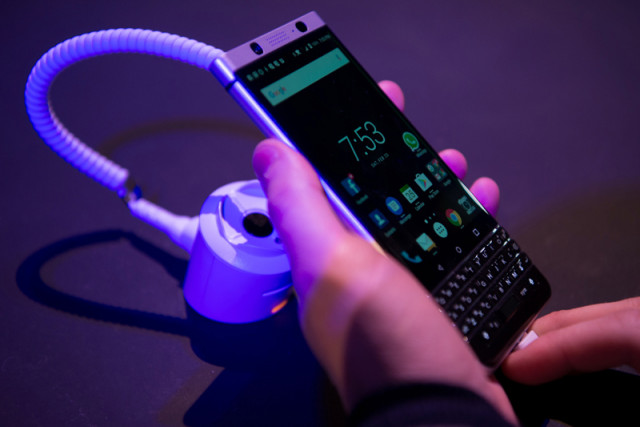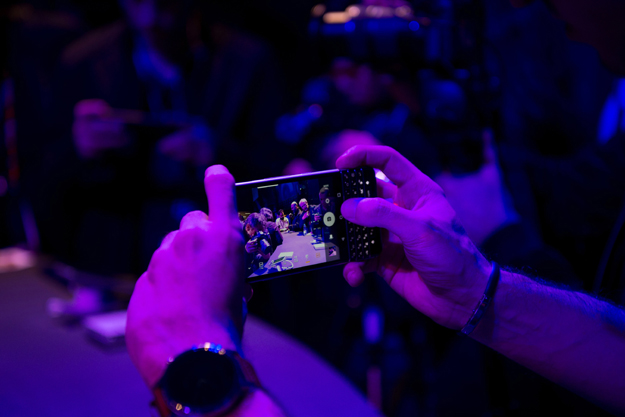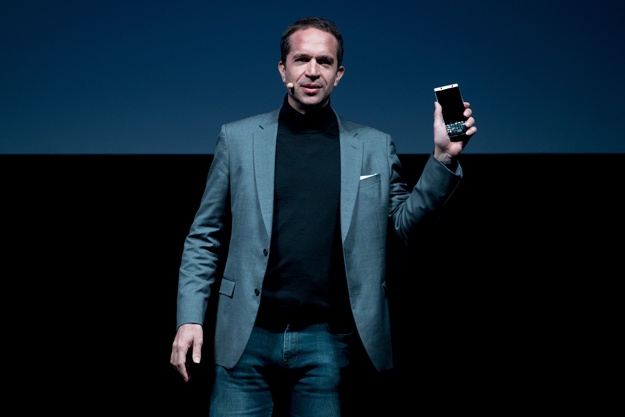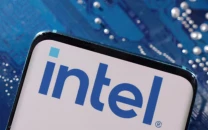China's TCL brings back physical keyboard in new BlackBerry KEYone
KEYone will go on sale around the globe in April at a cost of $549

The new BlackBerry Key One is displayed at the Mobile World Congress centre in Barcelona on February 25, 2017, before the start of the world's biggest mobile fair, held from February 22 to February 25. PHOTO: AFP
The KEYone phone has a larger screen than previous BlackBerry devices and a fast charging battery as TCL sets its sights on businesses and tries to rekindle BlackBerry's strong reputation for productivity and security.
TCL reached the brand-licensing deal in December after the Canadian company announced that it would halt in-house production of smartphones, marking the end of an era for the once-dominant tech firm.
 A journalist takes a photo with the new BlackBerry Key One at the Mobile World Congress centre in Barcelona on February 25, 2017. PHOTO: AFP
A journalist takes a photo with the new BlackBerry Key One at the Mobile World Congress centre in Barcelona on February 25, 2017. PHOTO: AFPUnder the agreement, BlackBerry will remain in control of software and security on smartphones, while TCL will handle creating handsets powered by Google Android software.
BlackBerry inks hardware licensing deal covering India
Officials from both firms unveiled the KEYone in Barcelona in northeastern Spain ahead of the start on Monday of the four-day Mobile World Congress, the world's largest annual phone expo.
BlackBerry worked closely with TCL to build security into the new device, said Alex Thurber, the general manager of BlackBerry's mobility solutions unit.
"At BlackBerry we live and breathe security. Security has been engineered into the entire manufacturing process, throughout the hardware and of course the software," he said.
BlackBerry's physical keyboard was one of the drivers of the popularity of its earlier phones but it was dropped once touch screens became popular.
The company in 2014 launched a "Classic" smartphone that brought back the keyboard but the device was discontinued in July.
In the new Blackberry phone the keyboard can be used for more than just typing.
The spacebar on the keyboard also doubles as a fingerprint sensor while individual letter keys can be programmed as shortcuts to open specific apps.
The device runs Android 7.1 – giving users access to the Google Play store and apps - and receives Google security patch updates, which many Android smartphones lack.
Here's all we know about Blackberry's latest flagship device ‘Mercury’
It also runs the BBM secure-messaging system, which BlackBerry earlier this month said it would make available for software developers to build into their own products.
With an aluminum frame and textured backing, the device sports two cameras - 12 megapixels in the rear and eight in front - and a scratch-resistant 4.5-inch screen display.
The KEYone will go on sale around the globe in April at a cost of 599 euros ($549).
 TCL Communcation's CEO Nicolas Zibell presents the new BlackBerry Key One at the Mobile World Congress centre in Barcelona on February 25, 2017, before the start of the world's biggest mobile fair, held from February 22 to February 25. PHOTO: AFP
TCL Communcation's CEO Nicolas Zibell presents the new BlackBerry Key One at the Mobile World Congress centre in Barcelona on February 25, 2017, before the start of the world's biggest mobile fair, held from February 22 to February 25. PHOTO: AFP"The new BlackBerry portfolio has a chance of success, because few companies now offer BlackBerry-style design and features, and the productivity-focused smartphone segment is underserved," said Ian Fogg, head of mobile at research firm IHS.
"Even if BlackBerry's smartphone share remains so low it is hard to quantify, the vast scale of the smartphone market -- over 1.5 billion units will ship in 2017 -- means even a tiny share would represent significant unit volumes and revenues," he added.
TCL said it would be coming out with new BlackBerry products later this year.
"What we are unveiling today is just the beginning of a new story," said TCL chief executive Nicolas Zibell.
BlackBerry once dominated the smartphone market but its lustre faded after the introduction in 2007 of the Apple iPhone and the large number of low-cost Android devices that followed.


















COMMENTS
Comments are moderated and generally will be posted if they are on-topic and not abusive.
For more information, please see our Comments FAQ